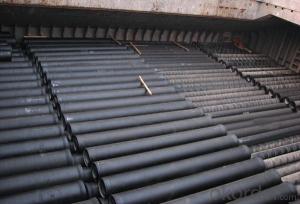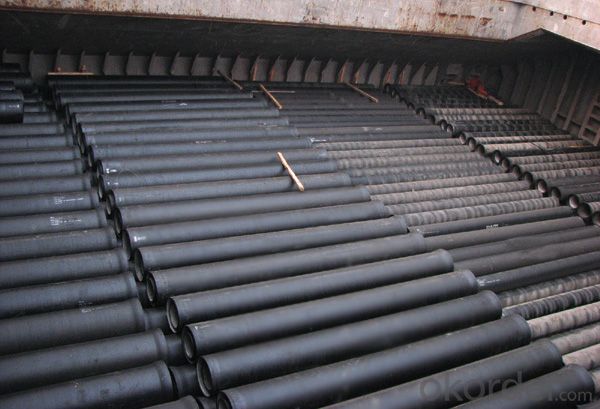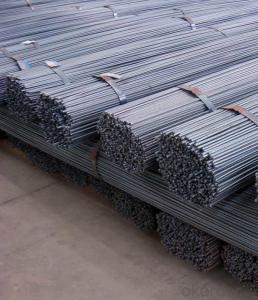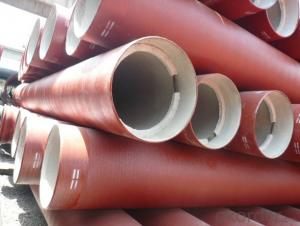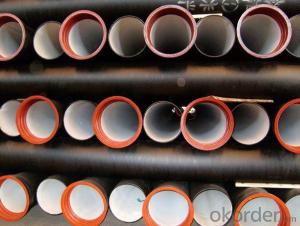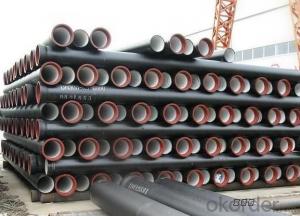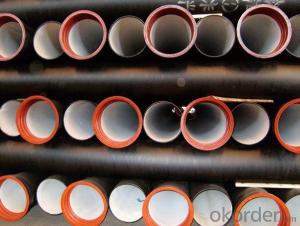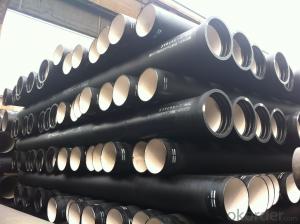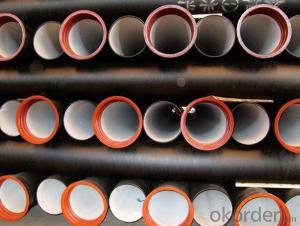Ductile Iron Pipe EN545/EN598/ISO2531 DN800 C25
- Loading Port:
- China main port
- Payment Terms:
- TT or LC
- Min Order Qty:
- 24 m.t.
- Supply Capability:
- 200000 m.t./month
OKorder Service Pledge
OKorder Financial Service
You Might Also Like
1,Ductile Iron Pipe Description :
DI pipe fittings are manufactured according to ISO 2531 or BS EN545 or BS4772 FOR POTABLE WATER ,internal is cement lining or wet epoxy coating;External is zinc plus bitumen or wet epoxy coating. We also manufacture ductile iron fittings with fusion bonded epoxy both inside and outside. All the producets are sutible to water pipes fields.We have passed ISO9001,ISO14001,OHSMS18001 certificate.
2,Main Features of the Ductile Iron Pipe:
•High yield strength
•High tensile Strength
•High corrosion resistance
•Pressure Resistence
•Anti-corrosion
•Installation is convenient
•Satisfy the highest hygienic standards
•Chemical checking
•NDE after rough machining
•Mechanical testing after heat treatment
•Full Q.A document as per client request
•Standard export package(carton/wooden case/pallet)
•Accept FOB,FAS,CNF,CIF door to door etc or customer designated shipping agent
3,Ductile Iron Pipe Images:
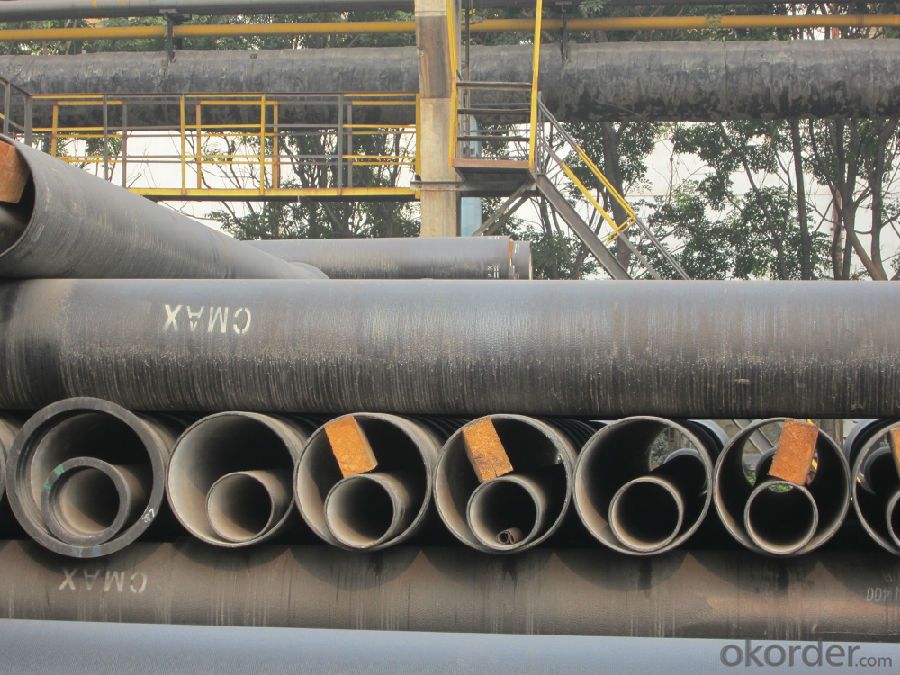
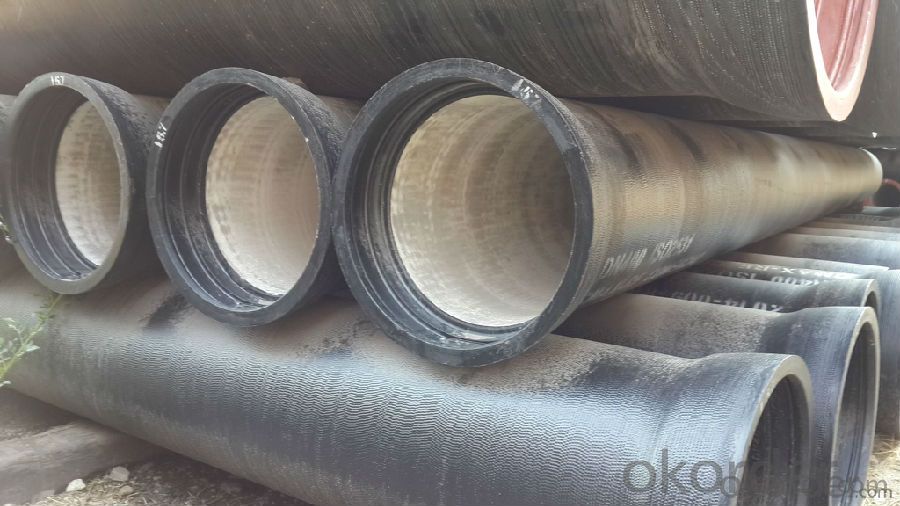
4. Ductile Iron Pipe Specification:
Standard: API SPEC 5L 44th eidtion,ASTM A252-98(2007)
Grade: A53 Grades A/B, ASTM A106 Grades B/C,ASTM A179
AWWA, C200, ASTM A139, ASTM A120, API 5L Grade B
X42, X52, X56, X60, X65, X70, X80, X100
Weld Alternatives: LSAW
OD size range: 6.4~44.5mm
Wall thickness: 406.4~1422mm
Length: 3 - 12 m according to requirment
Note: Other grade can also be provided after consulting. Special design are available
for coal slurry conveyance LSAW line tube -- Service
5.FAQ:
We have organized several common questions for our clients,may help you sincerely:
1.Q: Why would you choose ductile iron pipe rather than other pipe materials?
A:The reasons are obvious for that not only ductile iron pipe possesses the inherent strength and flexibility of ductile iron, combined with proven corrosion protection systems, but also the cost savings can be achieved from design to installation and commissioning.
2.Q:Why can you guarantee the inner of pipes can’t be corroded?
A: High alumina cement mortar lining and sulphate-resistant cement mortar lining. These two special linings are applicable to inner anti-corrosion for sewage pipes, improving resistance to erosion of the sewage components.
- Q: Are ductile iron pipes resistant to impact damage?
- Ductile iron pipes are known for their exceptional strength and durability, making them highly resistant to impact damage. Due to their unique composition, which includes a higher percentage of carbon and silicon, ductile iron pipes possess excellent toughness and flexibility. This allows them to withstand external forces and impacts, such as heavy construction equipment or accidental impacts during installation or maintenance activities. Additionally, ductile iron pipes have a high resistance to cracking and fracturing, further enhancing their ability to withstand impact damage. However, it is important to note that while ductile iron pipes are highly resistant to impact damage, they are not completely immune. Extreme or repeated impacts may still cause damage, albeit to a lesser extent than other types of pipes. Regular inspections and maintenance are crucial to identifying and addressing any potential impact damage to ensure the long-term integrity and performance of ductile iron pipes.
- Q: Can ductile iron pipes be used for trenchless pipe rehabilitation methods?
- Yes, ductile iron pipes can be used for trenchless pipe rehabilitation methods. Trenchless methods such as cured-in-place pipe lining or pipe bursting can effectively repair and rehabilitate ductile iron pipes without the need for extensive excavation. These methods provide a cost-effective and efficient solution for rehabilitating aging or damaged ductile iron pipes while minimizing disruption to the surrounding environment.
- Q: Can ductile iron pipes be used for stormwater management systems?
- Yes, ductile iron pipes can be used for stormwater management systems. Ductile iron pipes are known for their strength, durability, and corrosion resistance, making them suitable for handling stormwater runoff. They can effectively transport large volumes of water and withstand the pressure and impact associated with stormwater management.
- Q: How does the white iron appear in the case of ductile iron?
- If it is to solve the white cast, the casting can be annealed.To prevent a chill in the casting, it is important to know your entire casting process to find the cause and the solution.
- Q: How does ductile iron pipe perform in areas with high soil consolidation?
- In areas characterized by significant soil consolidation, the performance of ductile iron pipe is outstanding. This is because ductile iron possesses inherent strength and flexibility, making it an ideal choice for underground installations where soil consolidation is prevalent. The ground in areas with high soil consolidation often undergoes substantial movement and settling, presenting challenges for buried infrastructure. However, ductile iron pipe's unique characteristics enable it to withstand these conditions effectively. To begin with, the high tensile strength of ductile iron allows it to resist external forces and pressures exerted by the surrounding soil. This strength ensures that the pipe maintains its structural integrity even in areas with high soil consolidation. Furthermore, ductile iron exhibits exceptional resistance to deformation, enabling it to handle ground movement without cracking or breaking. Its flexibility allows the pipe to absorb lateral forces associated with soil consolidation, preventing any damage. Additionally, ductile iron pipe is renowned for its durability and long service life. It is highly resistant to corrosion, abrasion, and chemical attacks, further enhancing its performance in areas with high soil consolidation. This resistance guarantees that the pipe remains intact and fully functional, even in challenging soil conditions. Moreover, the joints of ductile iron pipe are designed to provide secure and leak-free connections. This eliminates the risk of soil infiltration, which can exacerbate soil consolidation and lead to further ground movement. In conclusion, ductile iron pipe is exceptionally suited for areas with high soil consolidation due to its strength, flexibility, durability, and leak-free joints. Its ability to withstand ground movement and maintain structural integrity makes it a reliable choice for underground installations in such conditions.
- Q: Can ductile iron pipes be used in dam or reservoir projects?
- Yes, ductile iron pipes can be used in dam or reservoir projects. Ductile iron pipes are known for their durability, strength, and corrosion resistance, making them suitable for various applications, including water supply systems in dams and reservoirs. Additionally, their ability to withstand high pressure and adapt to ground movement makes them a reliable choice for such projects.
- Q: How can the three pipes of ductile iron leak?
- When the pipe connection of the three water leakage, first of all to see whether it is to do the pipe three links of the manufacturers, pressure did not reach, if it is. It is only the replacement, if not, with cast iron electrode welding, or socket connection half!
- Q: How does ductile iron pipe handle ground movement and settlement?
- Ductile iron pipe is renowned for its exceptional capacity to accommodate ground movement and settlement. Thanks to its inherent strength and flexibility, it can endure substantial shifts in the ground without experiencing significant damage or failure. One of the primary advantages of ductile iron pipe is its remarkable tensile strength, enabling it to withstand external forces and pressures. This strength empowers the pipe to resist the effects of ground movement, such as soil settlement, subsidence, or shifting caused by seismic activity. Furthermore, ductile iron pipe possesses inherent flexibility, allowing it to absorb and distribute stress resulting from ground movement. The pipe's flexibility helps reduce the impact of settlement by enabling it to adapt and adjust to changes in the surrounding soil. This characteristic helps prevent the pipe from developing cracks, fractures, or leaks when the ground shifts or settles. Moreover, ductile iron pipes are frequently installed with flexible joints, such as push-on or mechanical joints, which further enhance their ability to accommodate ground movement. These joints provide a level of flexibility and movement, enabling the pipe to adapt to soil changes without experiencing concentrated stress or structural failure. Additionally, ductile iron pipe exhibits high resistance to corrosion, which is another crucial factor in its capacity to handle ground movement and settlement. Corrosion can weaken pipes and make them more vulnerable to damage during ground shifts. However, the corrosion-resistant properties of ductile iron help maintain the pipe's structural integrity and durability, even in challenging soil conditions. In conclusion, ductile iron pipe is ideally suited for handling ground movement and settlement due to its impressive tensile strength, flexibility, and corrosion resistance. These qualities enable the pipe to endure external forces and adapt to changes in the surrounding soil, minimizing the risk of damage, leaks, or failure.
- Q: Can ductile iron pipes be used for irrigation systems in agricultural fields?
- Yes, ductile iron pipes can be used for irrigation systems in agricultural fields. Ductile iron pipes are known for their durability, strength, and corrosion resistance, making them a suitable choice for various applications, including irrigation systems. These pipes are capable of withstanding high pressures and can handle the demands of transporting water for irrigation purposes. Additionally, the ductile iron material is resistant to environmental factors such as UV rays, soil chemicals, and temperature fluctuations, ensuring a long lifespan for the pipes. Furthermore, ductile iron pipes have excellent flow characteristics, allowing for efficient water distribution throughout the agricultural fields. Overall, ductile iron pipes are a reliable and robust option for irrigation systems in agricultural fields, providing a sustainable and efficient solution for water distribution.
- Q: Can ductile iron pipes be used for gas distribution networks?
- Yes, ductile iron pipes can be used for gas distribution networks. Ductile iron pipes are known for their strength, durability, and resistance to corrosion, making them a suitable choice for various applications, including gas distribution. These pipes can withstand high-pressure environments and are less likely to crack or break under stress. Additionally, ductile iron pipes have a long lifespan, reducing the need for frequent replacements and maintenance. However, it is important to note that specific regulations and standards must be followed when installing ductile iron pipes for gas distribution, ensuring proper safety measures and compliance with industry guidelines.
Send your message to us
Ductile Iron Pipe EN545/EN598/ISO2531 DN800 C25
- Loading Port:
- China main port
- Payment Terms:
- TT or LC
- Min Order Qty:
- 24 m.t.
- Supply Capability:
- 200000 m.t./month
OKorder Service Pledge
OKorder Financial Service
Similar products
Hot products
Hot Searches
Related keywords
